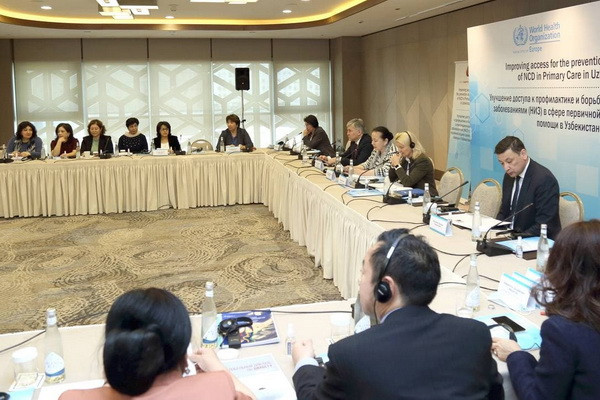
Improving access for the prevention and control of Noncommunicable Disease (NCD) in primary care in Uzbekistan
Tashkent, Uzbekistan (UzDaily.com) -- Today, 10 March 2022, the WHO Country Office in Uzbekistan, in collaboration with the Ministry of Health, hosted a high-level event on “Improving access for the prevention and control of NCD in Primary Care in Uzbekistan,” with the WHO Regional Office for Europe launching a three-year project co-funded by the World Diabetes Foundation to support Uzbekistan and Kyrgyzstan in addressing NCDs. The project’s three main objectives are as follows:
• to contribute in pursuing universal health coverage through improving control and prevention of complications for NCDs clinical practice with focus on primary care
• to improve the self-management of NCDs and chronic conditions by providing therapeutic education to patients and expanding the competences of nurses and other relevant providers
• to strengthen governance by implementing evidence-based policies and a system-approach to clinical practice and quality improvements.
It’s important to highlight that last year WHO and the World Diabetes Foundation have signed an agreement to launch a three-year project in Uzbekistan on improving access to prevention and control of NCDs in primary health care with an aim to contribute to the achievement of the Sustainable development goals, including reducing by one-third premature mortality from NCDs by 2030 and ensuring universal health coverage.
The session began with the opening remarks made by the Deputy Minister of Health, Basitkhanova Elmira Irkinovna, the World Health Organization Representative and Head of the Country Office in Uzbekistan, Dr. Lianne Kuppens, Deputy Director of Noncommunicable Diseases and Healthy Cities, Carina Ferreire- Borges, and World Diabetes Foundation Programme Manager, Mette Skar, highlighting the socioeconomic impact, as well as measures taken for the prevention and control of NCDs.
The impact of the major NCDs (diabetes, cardiovascular diseases, cancer, chronic respiratory diseases and mental disorders) is equally alarming: taken together, these five conditions account for an estimated 86% of the deaths and 77% of the disease burden in the Region. NCDs remain an urgent public health challenge in Uzbekistan. Up to 80% of deaths in Uzbekistan are attributable to NCDs.
Dr. Lianne Kuppens highlighted, “The economic damage caused by NCDs in Uzbekistan is equivalent to 4.7% of the country’s annual gross domestic product. Despite the challenges, the Government of Uzbekistan under President Shavkat Mirziyoyev’s leadership has taken important measures in addressing NCDs, which has been awarded at a global level. In November of last year, the President had announced that funds allocated for primary health care will be doubled, and a separate program for the prevention of the most common disease will be introduced.”
Another important segment of the event included the country situational analysis on diabetes and its complications, presented by Dr. Feruz Turaev, highlighting the challenges and recent developments in the country. Diabetes remains to be one of the four main types of noncommunicable diseases, constituting more than 245,000 patients in Uzbekistan.
Uzbekistan continues to take important steps towards the prevention of NCDs with technical guidance and support from WHO. The country’s firm resolve to tackle NCDs reflects Uzbekistan’s commitment to the Sustainable Development Goals and the European Programme of Work.